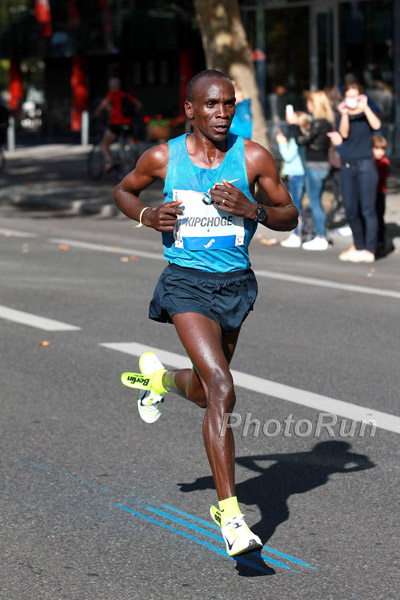1:59:40.2
Watching the clock stop at that time, as I witnessed Eliud Kipchoge break 2 hours in the early morning hours from a hotel bed in St. Louis, was one of the most memorable moments in my running life.
It had not been so many years ago that I had read a Runner's World feature about how the first sub-2 marathon might come about. I also devoured Ed Caesar's Two Hours, another fascinating exploration of the same topic. As far as I remember, both had predicted that yes, of course two hours would likely fall one day, but probably not for another few decades.
And now I was watching it happen.
On the one hand, I really don't care about the technological side of the whole affair. The rotating pacers, the exhibition style, the hand-picked course and date, and of course the shoes. The man - not the shoes - the man had just broken 2 hours. No one else in the world was capable; Nike's attempt had shown that only Kipchoge was at this level.
So I remain stunned by Kipchoge's race.
But it's not my favorite race ever, and that's because of the way Kipchoge decided to go about breaking the barrier. Because he chose to break 2 hours the way that he did, we will always be left to wonder: What if he had to wear the same shoes that I do? What if he ran in the same marathons as me, or used the same pacers as me, or had the same hydration as me?
Would it really have happened?
In other words, Kipchoge's approach separated his effort from the everyday experience of the common runner. The super shoes in particular have separated every new world record from the time before the super shoes. I personally don't think shoes should get the lion's share of the credit for world records, but it's hard to argue with the data: these shoes offer a tangible and measurable advantage across a significant sample size.
That's why Kipchoge's history-making efforts, while remaining beautiful and incredible to behold, can't stand as my own standards or dreams for human possibility. Kipchoge and much of professional running has become too disconnected from the everyman's experience.
His running is truly beautiful, but it also sometimes feels like he's operating under different conditions than everyone else. I loved his 2015 Berlin victory, where it was clear that his 2:04:00 blowout win was not thanks to the shoes, as you can see above.
Nowadays, most elite guys don't work for a living - they just run. They don't muddle their way through the intricacies of designing a training plan - they just hire a professional coach. They literally don't walk (run) a mile in my shoes - because their sponsors make them their own special prototypes.
To give Kipchoge his fair credit, he does the work to keep his running from becoming corrupted by the wealth and leisure of his prominence. He lives and trains in what most Americans might describe as poverty, holding onto that connection to the everyman's mindset and approach. It would be neat to see him race and break records with the same simple, everyman approach that he takes to daily life. Perhaps living outside the U.S. he doesn't perceive the extent to which his exhibition choices have sullied the admiration of his efforts. For better or for worse, he has become a participant in the Nike machine that is at the very forefront of this tech-driven, money-fueled approach to marathoning.
So while you can't take away from the magnificence and beauty of watching a man like Kipchoge fly across the earth with breathtaking grace and speed, there is perhaps something even more viscerally moving about the way things were done "back in the day". When running was a sport for amateurs, people like you and me who just loved to run, and ran like the wind.
That's why Yuki Kawauchi's 2018 Boston Marathon is my favorite race ever. Because there you have a true amateur - a working man from Japan who loves to run (and loves to race), who took time off work to show up on a windy, rainy, cold Boston morning and showed the pros how to run a real marathon in real conditions.
He was fearless, gritty, smart, and absolutely unorthodox and unprofessional. In Kawauchi, every hobby jogger can see himself and realize that this isn't just a sport for the elites. Distance running doesn't need more money, better shoes, fewer hills, or more corporate sponsorships. It needs real people, you and me, logging the miles in training, racing our hearts out and then getting back to work.
Real work.
Kawauchi isn't even an amateur anymore; he's rightfully earned and embraced the pro runner status after his Boston victory. But the man has done his part, showing that if the wind blows just right, a normal guy like him, well-prepared and gifted with talent, can still take on the world and win.
I am not saying that every hobby jogger has a Boston Marathon victory in him. But perhaps a Boston Marathon qualifier. A new PR. A local 5K victory. An ultramarathon finish. You get the idea.
It's really not that complicated. Just damn difficult. Do the work. Run the miles. Take the blue-collar approach. Keep moving.
As Kawauchi repeated to himself as he powered against the wind in the final miles of Boston, "forward, forward, forward."
For further reading, I'll leave you with the two best English-language articles I've found on Kawauchi:
New York Times human-interest piece
Full Boston piece from Japan Running News




No comments:
Post a Comment